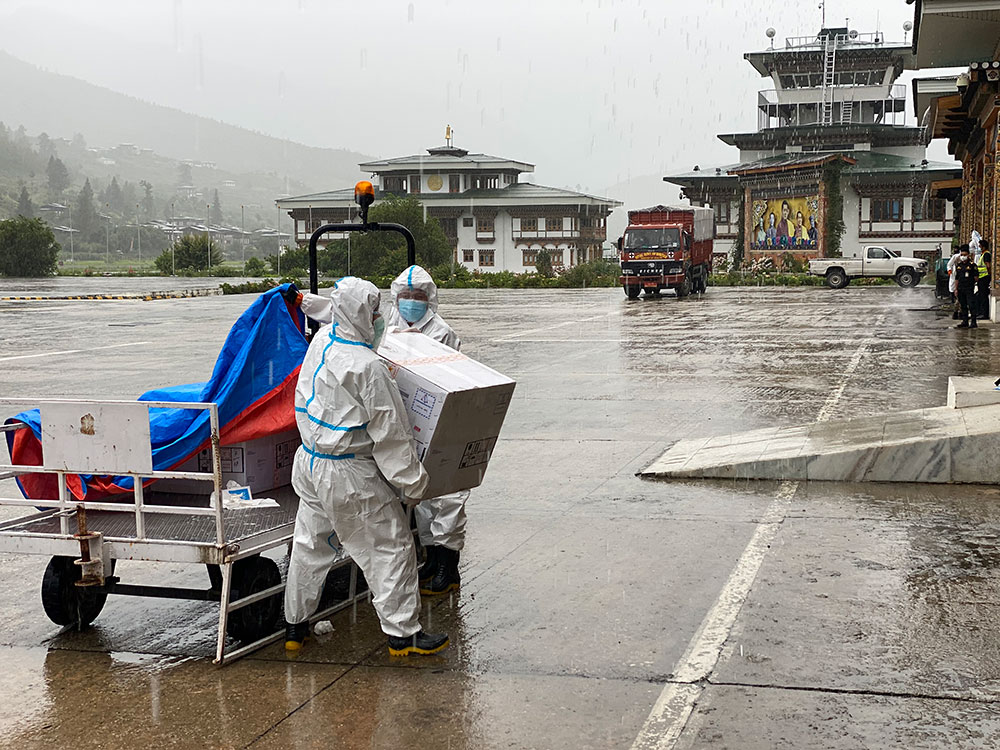Children in the south of the country to receive Moderna starting tomorrow
Younten Tshedup
Children between the age group of 12 and 17 years will receive the Moderna vaccine starting tomorrow.
Moderna is the second vaccine that is approved for use in children for this particular age group.
So far, more than 5,000 doses of Pfizer vaccine have already been administered among children in Phuentsholing and Samtse.
The Drug Regulatory Authority (DRA) authorised the emergency use of Moderna vaccine for children between 12 to 17 years in the country on July 26.
DRA’s chief regulatory officer, Ngawang Dema, said that the approval was made following European Medicines Agency’s (EMA) approval of the Moderna vaccine in children. “The EMA had reviewed and concluded that the Moderna vaccine had the same level of efficacy and side effects in children which were observed in the adult population.”
The health ministry, upon the recommendation of the National Immunisation Technical Advisory Group (NI-TAG), stopped administering the Moderna vaccine to the adult population since yesterday.
There are about 50,000 doses of Moderna vaccines left from the week-long campaign.
Sowai Lyonpo Dechen Wangmo said that coinciding with an auspicious day, children between 12 and 17 years would be administered the Moderna vaccine starting tomorrow.
The remobilisation process of the vaccines from all the 1,200 plus vaccination centres is underway.
Lyonpo said: “Our priority is the high-risk areas.
We have already vaccinated children in Phuentsholing and Samtse with Pfizer. Some 16,000 plus children would receive the Moderna vaccine in the south this time.”
Once all eligible children in the south are covered, Lyonpo said that children in Thimphu will be vaccinated next. “For now, we are looking at around 6,000 children in Thimphu.”
Additional dose of Moderna vaccine would be stored for those children attaining eligible age in the coming months.
Second dose coverage
Latest figures with the health ministry show that 90 percent of the eligible population in the country were vaccinated with their second dose of Covid-19 vaccine as of yesterday.
Lyonpo said that an achievement such as this was only possible in Bhutan. “Our success is because of His Majesty’s leadership and his continued support in this fight. It is because of the blessings from the Je Khenpo and the religious leaders. And, it is because of the solidarity of our people.”
She said that it would not be long before Bhutan achieves the desired vaccination coverage of 80 percent of the entire population to attain herd immunity. “For a small country, if we can work together, anything is possible. When the entire world is struggling from the pandemic, we are all extremely blessed to be in Bhutan.”
Lyonpo thanked the governments of India, United States, and Denmark for making the second mass vaccination campaign a success.
News of Bhutan’s successful second dose vaccination coverage is already making headlines internationally.
UNICEF Bhutan representative, Dr Will Parks, said: “Bhutan is now a beacon of hope for the region, at a time when the Covid-19 pandemic has upended lives and devastated families. The successes are testimony to Bhutan’s swift response to the Covid-19 pandemic.”
He said that in such challenging times, the leadership of His Majesty The King, the blessings of His Holiness the Je Khenpo, and the collective efforts of the government, local leaders, young people, and development partners have been instrumental in the country’s huge leap forward.
He said that with the home-based vaccination continuing until July 31, the coverage was likely to increase in the coming weeks. “A total of 2,401 health workers helped to vaccinate the eligible population with the second dose from 20 to 26 July across the country, arguably the fastest vaccination campaign to be executed during a pandemic. The precision with which Bhutan conducted mass vaccination campaigns within a week is an extraordinary achievement.”
He also applauded the efforts that went into securing the second dose of Covid-19 vaccines and, in particular, the government’s effort to reach the targeted groups spread across the mountains and dense forests. “Bhutan’s successful vaccination drive is a powerful example of how the donations of vaccines, secured bilaterally and multilaterally, can help protect and save lives.”
He added: “UNICEF and partners are honoured to have assisted the Royal Government of Bhutan in strengthening the cold chain system to store the vaccines.” UNICEF also provided critical logistical and operational support in fast-tracking the shipment of vaccines and injection devices to the country.
Edited by Jigme Wangchuk


